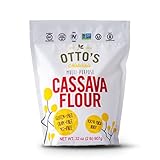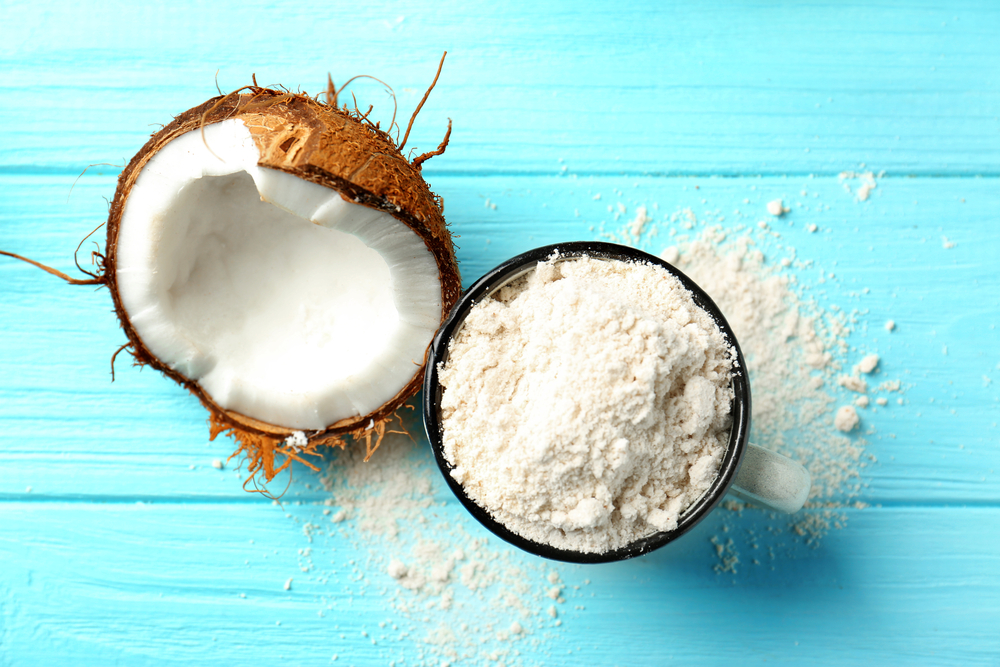Coconut flour is a whole food that has been shown to have some health benefits. It is a gluten-free alternative to traditional wheat flour. It is made from dried coconut meat that is ground into a fine meal. The meal can be used in various recipes to create baked goods, bread, or other foods without the use of traditional flours. Coconut flour can also go bad if not stored correctly, so it’s essential to know how long coconut flour lasts before tossing it.
Coconut flour can go bad and develop a bitter taste, bad smell, and become clumpy. The coconut flour will last until the “best by” date printed on the package if it has been opened. The unopened coconut flour will be fresh three to six months after this date. To prolong this time, store coconut flour in the fridge or freezer.
This article will explore more of the ways you can know if coconut flour has gone bad and ways to prolong the life of your coconut flour.
Contents
- Does Coconut Flour Go Bad Over Time?
- Can I Sub Coconut Flour for All-Purpose Flour?
- How Can You Tell If Coconut Flour Has Gone Bad?
- How to Properly Store Coconut Flour
- Does Coconut Flour Go Bad After Opening?
- Can You Get Sick from Old Coconut Flour?
- Are There any Health Benefits to Using Coconut Flour?
- Alternatives to Coconut Flour
- Related Questions
Does Coconut Flour Go Bad Over Time?
Yes, Coconut flour does go bad over time, but this depends on how fresh it was when you first bought it. The “best by” date printed on the packaging is three to six months after the coconut flour was made. If you have opened your coconut flour and are curious about its ripeness, there are ways to check it for freshness.
- Look for clumps
- See if it smells funny
- Check for a bitter taste
If you notice any of these, throw away the flour and start fresh. If you don’t see any of these issues, consider the flour safe to use.
Can I Sub Coconut Flour for All-Purpose Flour?
Yes, you can sub coconut flour for all-purpose flour in most recipes. If done correctly, this substitution will not change the texture of your recipe. You will need to use significantly less coconut flout than AP flour. A good tip is to use about 20% of what the recipe calls for if you choose to use coconut flour. Coconut flour is an excellent alternative for gluten-free baking.
How Can You Tell If Coconut Flour Has Gone Bad?
There are a few ways to tell if coconut flour has gone bad. If you notice clumps in your coconut flour, this is a sign that the flour has gone bad. A good way to check for clumps is to run your fingers along the top of the container and feel for any that don’t feel right.
Coconut flour has a mild and sweet flavor and a subtle taste of coconut. The same can be said of the smell. If your coconut flour smells terrible or tastes bitter, it’s a sign that it has gone bad and should not be consumed.
It would help if you also kept an eye out for mold, discoloration, or bugs before using the flour.
How to Properly Store Coconut Flour
Steps for storing coconut flour are like that of any type of flour.
- Transfer your coconut flour to an airtight container, especially if it has been opened.
- Store the flour in a cool and dry location and away from heat and light of any kind.
- If you don’t plan to use your coconut flour for a few weeks, consider storing the flour in the fridge.
- Store it in the freezer if you need the flour to keep a few months.
Does Coconut Flour Go in The Fridge?
While it isn’t necessary, coconut flour can be stored in the fridge. Storing coconut flour in the fridge will prolong the freshness of the flour by three to six months. If you want to store coconut flour in the fridge, make sure it is transferred to an airtight container to prevent moisture from ruining the flour.
Does Coconut Flour Go Bad at Room Temperature?
No, coconut flour doesn’t go bad at room temperature. It can be used until the “best by” date on the packaging, or if left unopened, it can be used three to six months beyond this date.
Does Coconut Flour Go Bad After Opening?
Yes, coconut flour can go bad if opened and not stored properly. The best by date is around three to six months after being opened. If you do not store your coconut flour in the fridge or freezer, it will last about three to six months and then it will go rancid and need to be thrown away.
Can You Get Sick from Old Coconut Flour?
Yes, if it has turned moldy, become discolored, or has a sour taste and smell, the flour can make you sick if you consume it. Gluten-free flours like coconut and almond flour have a shorter shelf life due to the amount of fat they contain. However, they can be used beyond the “sell by” date if it hasn’t been too long.
Are There any Health Benefits to Using Coconut Flour?
Coconut flour is a great gluten-free alternative to traditional flours. Being made exclusively from coconuts, the flour is high in fiber and MCTs. These will help people with diabetes stabilize blood sugar levels, promote good digestion. Coconut has also been linked to weight loss and aids in feeling full.
Alternatives to Coconut Flour
If coconut flour isn’t your cup of tea, there are other healthy flour options available on the market
Anthony’s Blanched Gluten Free Almond Flour
 Almond flour is a great alternative to coconut flour and probably the best choice. It is high in fiber, protein, and vitamin E. It is also low in carbs and full of healthy fats.
Almond flour is a great alternative to coconut flour and probably the best choice. It is high in fiber, protein, and vitamin E. It is also low in carbs and full of healthy fats.
Anthony’s makes their almond flour from 100% California blanched almonds with no preservatives or GMOs. Almond flour is also gluten-free and keto-friendly.
Otto’s Naturals Cassava Flour
 Cassava flour is another alternative to coconut flour. Made from yuca, it is similar in texture to wheat flour and has a neutral flavor, unlike coconut flour. Cassava flour can be used in place of wheat flour with no adjustment to the recipe needed.
Cassava flour is another alternative to coconut flour. Made from yuca, it is similar in texture to wheat flour and has a neutral flavor, unlike coconut flour. Cassava flour can be used in place of wheat flour with no adjustment to the recipe needed.
Otto’s makes gluten-free, non-GMO cassava flour from 100% yuca root. It is free from the top eight allergens and produced on dedicated equipment, so there is no possible cross-contamination.
Anthony’s Brown Rice Flour
 Rice flour can be used as a substitute for coconut flour as well. There are two types of rice flour white and whole-grain. White rice flour is like white flour, and whole-grain rice flour is closer to whole wheat flour.
Rice flour can be used as a substitute for coconut flour as well. There are two types of rice flour white and whole-grain. White rice flour is like white flour, and whole-grain rice flour is closer to whole wheat flour.
Anthony’s Brown rice flour is non-GMO, vegan friendly, and gluten-free. It is also fine, making it easy to measure and incorporate into recipes. Keep in mind that you will need more rice flour than wheat flour.
Naturevibe Botanicals Organic Soy Flour
 Soy flour, made from soybeans, is a high protein alternative to coconut flour. The flavor is different from coconut flour, being less sweet and nuttier. If you choose soy flour, make sure you use double to amount.
Soy flour, made from soybeans, is a high protein alternative to coconut flour. The flavor is different from coconut flour, being less sweet and nuttier. If you choose soy flour, make sure you use double to amount.
Naturevibe Botanicals soy flour is organic, non-GMO, and gluten-free. It can be used in place of wheat flour or combined with it to make healthier baked goods.
Organic Ground Golden Flaxseed Meal
 Flaxseed is an interesting alternative to coconut flour. It is high in omega-3 fatty acids, making it a good substitute for eggs as well. It works best in combination with another flour due to its oil content.
Flaxseed is an interesting alternative to coconut flour. It is high in omega-3 fatty acids, making it a good substitute for eggs as well. It works best in combination with another flour due to its oil content.
FGO ground golden flaxseed meal is certified organic and cold-milled. Grown in the USA and non-GMO this flaxseed is an excellent alternative to coconut flour.
Related Questions
Can I Use Coconut Flour If It Has Turned Brown?
As with most foods, if coconut flour has turned brown or changed color in any way, it is best not to use the flour as it most likely has gone bad. If the flour is discolored, this can also be a sign of mold or bugs, thus making anyone who consumes it sick.
Does coconut flour soak up liquid?
Yes, coconut flour is incredibly absorbent. Therefore, it is recommended to add extra eggs, water, or other liquids when using it for baking to aid in binding. Another alternative to using more liquid is to use less flour than you would traditional all-purpose flour. If you use about 20% of the required amount, you will get a similar result to using traditional flour. Keep in mind, each recipe will behave differently, and you might need to give it a couple of tries to get the recipe perfect.
Can coconut flour be used for frying?
Yes, coconut flour can be used for frying. Coconut flour tends to have more clumps and should be thoroughly sifted before mixing it with eggs and other ingredients. You may also need to use more liquid and eggs as coconut flour will absorb more than all-purpose flour.
